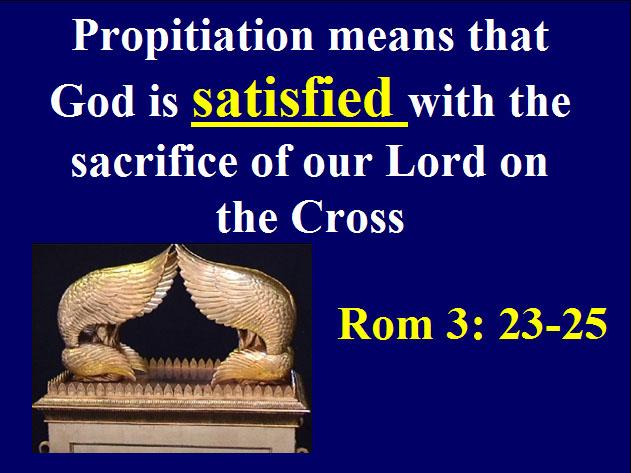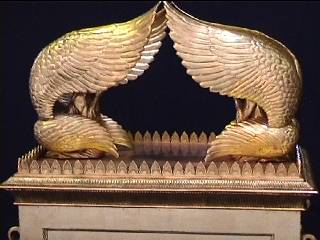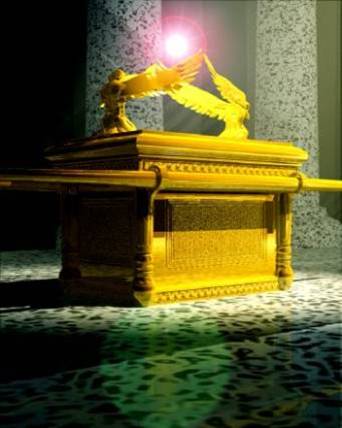



Rom 3:21-26; Joh 3:36; Rom 8:31-32; Isa 53:5-6; 1Pe 2:24; Heb 9:3-5; Exo 25:8-22; 1Jo 2:1-2; 1Jo 4:10.
BAS-25-120724 - length: 61:37 - taught on Jul, 24 2012
Class Outline:
Salvation is
God’s complete work by which He
rescues man
from eternal ruin,
and bestows on him
the riches of His grace.
The blood of Christ - His substitutionary spiritual death on the cross - provided redemption, expiation, propitiation, and reconciliation for every man.

Propitiation (in relation to God): means “satisfaction”. God the Father is completely satisfied with the work of Christ on the cross.
Propitiation reveals the ultimate reason why Christ went to the cross: to vindicate the character of His Father.
1. Propitiation is the God-ward side of the work of Christ in salvation.
The substitutionary spiritual death of Jesus Christ on the cross satisfied the righteous demands of the holy God that the sins of the entire world be judged.
2. Propitiation is the aspect of the work of Christ on the cross that deals with the integrity of God.
The integrity of God is the harmonious operation of three divine attributes: His righteousness, His justice, and His love.
3. Propitiation means that our Lord satisfied the Father.
In propitiation, the justice of God judges our sins and the integrity of God is satisfied with that judgment.
4. Christ’s death was necessary, and it was made so by the character of God.
But now, at the cross, God’s righteousness is shown publicly.
All access to the Holy of Holies is based on the work of Christ on the cross.
JOH 3:36
"He who believes in the Son has eternal life; but he who does not obey [refuses to place His trust in] the Son will not see life, but the wrath of God abides on him."
It is to the holiness of God that we must look for the necessity of propitiation.
Propitiation does not so much indicate that God is offended, but rather that God is holy and cannot be approached by sinful creatures without a remedy.
We have these two results of Christ’s death:
(1) toward God
(2) toward sinners
It is of
first importance that God should be glorified
where sin had so dishonored Him.
We need to train our spiritual eyes to see the cross as first of all glorifying God!
The blood of Christ witnesses at once the infinite holiness and righteousness of God, and also His fathomless love and grace.
In fact, the blood of Christ reconciled the love of God and the holiness of God when it came to the problem of sinful man.
God’s character and nature do not change. The cross is the deepest witness of all to that fact.
5. Divine justice must judge the sins of man before divine justice is free to bless sinful man.
Our Lord received the imputation of our personal sins, and He received the judgment for those sins.
God isn’t gracious to us because He swept our sins under the rug. They were imputed to Christ and judged.
6. When the justice of God judged the sins of the world in Christ on the cross, both the righteousness and justice of God were satisfied.
The righteousness of God was satisfied with the Person of Jesus Christ, and the justice of God was satisfied with the Work of Jesus Christ.
Now the justice of God can provide blessing without compromising any attribute of
divine essence.
Propitiation is the
God-ward side of salvation. Reconciliation is the
man-ward side, and Redemption and Expiation are the sin-ward side.
7. Propitiation relates directly to the integrity of God. Propitiation means that the act of judgment satisfies the integrity of God.
ROM 3:25-26 says that Jesus Christ was
publicly displayed as the mercy seat, the place of the propitiation (or satisfaction) of
God’s justice.
The Greek word for “propitiation” here in verse 25 is hilasterion.
Hilasterion means the place of propitiation, the mercy seat.
Here in HEB 9:5, hilasterion clearly refers to the mercy seat, the golden cover for the Ark of the Covenant.

The wood represents the humanity of Christ;
the gold represents the deity of Christ. Together, they represent the Hypostatic Union.
In the Greek Old Testament called the Septuagint and often abbreviated “LXX”, twenty two times hilasterion translates the Hebrew kapporeth, “the mercy seat”.
It chiefly refers to the mercy seat of the Ark of the Covenant. This was the golden cover of the sacred chest in the Tabernacle or temple.

The two cherubs of gold represent the righteousness and justice of the integrity of God.
The righteousness and justice of God saw the blood of the animal covering the mercy seat, and it represented the finished work of Christ on the cross.
ROM 3:25-26 says that Jesus Christ was
publicly displayed as the mercy seat, the place of the propitiation (or satisfaction) of
God’s justice.
The place where we are to meet with God is through the Person of Jesus Christ, our Mercy Seat. He is the Mediator between God and man (1TI 2:5).
The Greek noun hilasmos
refers to the sin offering itself. It means the propitiatory sacrifice, the means of propitiation, the One who makes propitiation.
The Lord Jesus Christ is also the propitiatory sacrifice itself.
His blood is the means by which propitiation is accomplished.